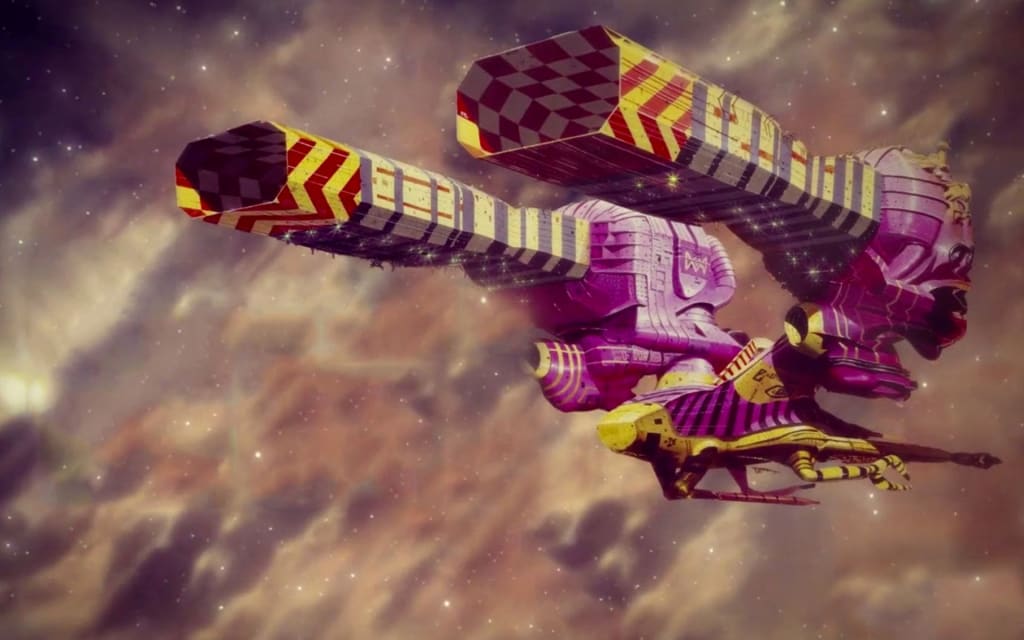Jodorowsky's Dune
Frank Pavich’s Dune documentary chooses Jodorowsky over Paul Atreides as the hero.

Near the start of Jodorowsky's Dune, Frank Pavich’s new documentary on the unmade movie version of novel Dune, its primary subject—auteur filmmaker Alejandro Jodorowksy —tells the audience he wanted his version of to make people feel like they were tripping on LSD. In Jodorowsky's Dune, the powerful self-appointed messiah isn’t a prescient hero named Paul Atreides—it’s Jodorowksy himself. He speaks to his cat in the middle of interviews, rants like a child throwing a temper-tantrum, and grins, Cheshire-like, before declaring “I rape the Frank Herbert. BUT with love!” Is this guy for real? No! But that’s sort of the point.
Alejandro Jodorowsky Prullansky is a Chilean film and theatre director, screenwriter, playwright, actor, author, poet, musician, comic book writer, and even spiritual guru. He is best known for his avant-garde films that tend to be filled with violently surreal images and a blend of mysticism and religious provocation. Before he became a director, he worked as a clown in the theater troupe the Teatro Mimico. After the failed attempt of Dune, he worked on three more films, Tusk, Santa Sangre, and the Rainbow Thief (a blockbuster fail). After that, he began writing a series of science fiction books. He has also written books about his spiritual system. He released his first feature film, Fando y Lis, in 1967 that created a huge scandal in Mexico that eventually got banned. This other films include El Topo and The Holy Mountain.

Painting by Chris Foss
Like the know-it-all film buff at a party making snobby sweeping generalizations, Pavich’s documentary draws a sloppy parallel between the martyrdom of Dune’s fictional hero Paul Atreides and Jodorowksy’s failed movie itself. For anyone who loves the Frank Herbert novels, enjoys David Lynch’s 1984 film adaptation, or even tolerated the 2000 SciFi channel TV miniseries, Jodorowsky's Dune will make you feel like you missed a memo, and that memo reads: you’re stupid for liking those movies. Compounding this weird ontology is an odd assertion from the super-cool director of Drive, Nicolas Winding: “What if the first film of that nature had been Dune and not Star Wars?” Wow. Is your mind totally blown yet? Don’t you think we deserved a smart and arty science fiction film, instead of the money-grubbing dumb movies we have in the post-Star Wars world?
To back up a bit, in 1975 Alejandro Jodorowsky took over the film rights for the film Dune from Arthur P. Jacobs. Jacobs originally had the rights in 1973 but died before a film could be developed. Virgin Records also joined the project to help determine the music, with Pink Floyd and Magma were chosen for some of the music. Artists H. R. Giger, Chris Foss, and Jean Giraud were on the project for character design. Dan O’Bannon was in charged of special effects. Salvador Dali, Orson Welles, Gloria Swanson, David Carradine, Mick Jagger, and Amanda Lear were all part of the cast. Before the production stage, $2 million of the $9.5 billion budget was already spent. It was also found out that the script would be a 14 hour film. The film ultimately flopped because no studio wanted to pay Jodorowsky's terms. Then that’s when Pavich jumped into it to create the documentary.
This kind of thing is flagrant and ridiculous hyperbole. The film’s attitude is overly simplistic, and made worse by its various talking heads—Refn being the worst and most reductive. Why does Star Wars need to get thrown under the space bus for us to feel the pain of Jodorowsky’s Dune? The documentary makes some fairly weak and unsubstantiated jabs at “similarities” between Star Wars and the storyboards of this Dune, but it feels like a fairly cheap shot, or, to be really mean, borders on intentional ignorance.
To be fair, Jodorowsky’s Dune did result in H.R. Giger, Chris Foss, and Dan O’Bannon’s collaborative work on Ridley Scott’s 1979 Alien. This documentary takes pains to remind us that these three guys did, definitely, all meet and start working together because of the ill-fated Dune, a consequence of Jodorowsky’s brilliant mad idea to bring them all together—and it’s sad when Jodorowsy laments how Hollywood used “his warriors.”

Poster by Kilian Eng
You’d have to be a monster to not feel for this guy and his insane passion project. That said, I don’t think my understanding of the Alien connection and sympathy for Jodoworsky justifies the nearly three-minute sequence toward the end of Jodorowsky’s Dune, in which everything from Terminator, Flash Gordon, Master of the Universe,and Raiders of the Lost Ark are somehow indicted as knock-offs of this aborted film. Arguing for a science fiction cinema landscape dumbed down by Star Wars’ success is totally fair, but this version of Dune was in development long before that. (If you want to read about a movie getting actually screwed by post- Star Wars fever; I recommend Harlan Ellison’s I, Robot)
As a science fiction critic and fan, my real complaint is Jodorowsky’s surrealist approach to the source material. “I never read Dune!” he gleefully boasts—and he’s not kidding. As the documentary starts to get into the specifics of this cinematic version of Dune, you might find yourself at a loss trying to compare the narrative to the novel. H.R. Giger, famously hired to design the Baron Harkonnen’s palace, points out—correctly—that what he was designing did not appear in Herbert’s text. I’m no purist when it comes to cinematic translations of any literary material, but the liberties Jodorowky wanted to take make any betrayals from the Lynch or SciFi channel versions look tame by comparison. The weirdest difference between the book and this unmade movie? In Jodorowsky’s Dune, the planet Arakkis has its entire ecosystem revitalized through love, and sets out to educate everyone in the universe about how to be better. If this movie came out today, with that ending, fans would riot.
I’m happy to report, however, that this documentary is strangely magnetic. Its force is in its ability to make you side with Alejandro Jodorowksy. He’s charming, and not just because he’s a kooky eccentric; he comes across as a genuinely kind person who views his art as a civil right. Would I be captivated by this man if I met him in person? Yes. Would I want to see any movie version of any science fiction classic he dreamed up? You bet. And, do I think Nicolas Winding Refn is right when he says Hollywood was “afraid” of Jodorwoksy? Yep. Totally. I’m just not buying this particular propaganda.

Painting by Chris Foss
In the 1970 book Science Fiction in the Cinema, John Baxter writes—channeling SNL’s Coffee Talk Lady—that “science fiction films are neither science fiction nor films,” an assertion which seems arrestingly true once you watch and truly absorb this documentary. Why would anyone bother with such a crazy task? No one cares about “good” science fiction movies anyway! It’s hard to avoid the conclusion that we should all be thankful for people like Alejandro Jodorowksy. I think it’s okay to love Jodorowsky’s Dune with all your heart, because it’s fascinating, heartfelt and charming.
Charming, sadly, is not the same as convincing. Documentaries about alternate universes of pop culture may be an amazing medium to discuss how science fiction collides with art, and this documentary is a great example of a burgeoning speculative non-fiction genre. But, the big problem with this alternate universe is it feels less like a real exercise in “what-if” and more like a culty, well-made, but totally unconvincing conspiracy theory. Once you stop drinking Jodorowsky’s Spice-Flavored Kool-Aid, then you may come to the same conclusion as me: after all the crazy stories, stirring speeches and boundless imagination, there’s still really no compelling evidence to believe that this ambitious project would have turned into a good science fiction story—or even a good film.
The 1980 Tusk film directed by Jodorowsky is one of the two movies that the talented director decided to disown. While earlier films that Jodorowsky produced could, to some extent, be considered masterpieces, Tusk received a much less friendly accolade. Its poor reception by the fans and critics alike evinced the fact the film was a total failure.

Painting by Chris Foss
Jodorowsky’s Tusk
Tusk was a French production whose storyline was based on a children’s book, so therefore, it wasn’t looking to sell to fans who wanted questionable content. It takes us through an adventurous journey of Elise in her struggles to take care of her elephant. Elise is a young girl whose life revolves struggles of colonial India. She develops a bond with the elephant, something that can somewhat be considered sedate, at least going by a psychedelic view. However, the scenes boast of some amazing visual tricks that add some sparkle to the entire film, if Jodorowsky’s previous productions are anything to go by.
One major theme that flows through the film is the negative depiction of colonialism and ample illumination of the atrocities of the colonialists. Furthermore, this not so hidden message can be seen in the lack of continuity of the message. Considering that Tusk is a film meant for children, it comes as a surprise that the movie is handled the same way other ethnographic productions of the time are also handled. Under this kind of assessment, the film comes out as unremarkable as and less appealing than the other films like “The Gods Must Be Crazy”. Even so, Jodorowsky represents an eccentric view of the Indian way of life in an entirely natural and accurate way. However, the director’s vision for the film does not come out as he had hoped. From the stiff acting to the misrepresentation of the nature of the villains in the movie, the production ultimately fails to capture the intended Indian scenery.
Tusk brings to light the fact that Jodorowsky has a particular appreciation for India, its culture and its wildlife. This affinity is evinced by the elaborate and incredible directing of the scenes that involve the elephants, an intervention that adds a little bit of flow and flavor to the film. It is these scenes that account for most of the few positive reviews that the movie has and also makes the beginning parts of the movie enjoyable. Furthermore into the film then one realizes that the level of inconsistency ultimately outweighs the fantastic elephant scenes.
Unlike Tusk, Jodorowsky’s work on Dune did not totally go into waste. It formed a precedence for the development of future sci-fi films. 1975 film Dune was an unsuccessful attempt by Jodorowsky to turn the science fiction novel Dune into an award winning movie. However, unlike Tusk, the film did not survive long enough to be completed. Its budget was completely unsustainable, and the movie itself was scheduled to have a total run time of up to fourteen hours! Imagine watching a low graphics movie for 14 continuous hours! The project eventually collapsed, and it’s only a few years later that the rights to the master novel went to another director.
About the Creator
Ryan Britt
Published in The New York Times, The Awl, Clarkesworld, Crossed Genres, Nerve, Opium, Soon, Good, and Tor.com. Currently a consulting editor for Story Magazine.






Comments
There are no comments for this story
Be the first to respond and start the conversation.